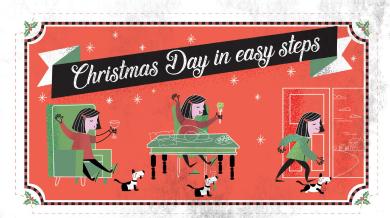Starving, sprouts and strolls: how to step into Christmas healthily
- Common mistake is to starve before Christmas dinner, according to University of Warwick expert
- Traditional post Christmas dinner walk is good for relaxing, and family bonding, but don’t use it as an excuse to feast later!
- Look out for small festive treats piling up while you graze
- Christmas sprouts are ‘good medicine’, but overindulgence can lead to bloating with gas – uncomfortable for you, and potentially unpleasant for others!
Y ou can offset some of the effects of Christmas overindulgence with a few easy steps – quite literally!
ou can offset some of the effects of Christmas overindulgence with a few easy steps – quite literally!
According to a University of Warwick expert, a post Christmas dinner stroll will do more to keep you in the festive spirit than starving yourself beforehand, while a good portion of that winter favourite Brussels sprouts has great health benefits – but too many and you will feel the effects, inside and out!
We’re also advised to watch out for filling up on those party nibbles and bite-sized treats that we graze on throughout Christmas Day.
We’ve all felt the effects of overindulgence during the festive season, so Dr James Gill, from the University of Warwick and a locum GP, has given some advice on how to avoid those common Christmas complaints.
So what do people complain of over Christmas - apart from that ill-fitting ‘novelty’ jumper from their grandparents?
Dr Gill said: “Arguably the commonest mistake people make at Christmas is trying to starve themselves before going into the Christmas dinner. Yes, you might save a few calories, by skipping breakfast, but you’ll probably be so hungry by the time dinner arrives you’ll eat more than you intended, and not taste it either!
“Opt for a small healthy breakfast, and if needs be, if you are headed to a late lunch, maybe even a (healthy) snack to take the edge off the hunger.
“Many people like to indulge in a post-Christmas preamble after their feast. Christmas is a time for community and family, so I would thoroughly endorse that Christmas walk, but keep in mind your reasoning. Walk for the enjoyment, not merely to create a little more room to continue the feast later.
"Look at it this way – a 30 min walk will only burn off the calories from the 400kCal cinnamon roll you had for dessert. But there are a host of other health benefits from a regular stroll – reduce risk of heart disease, stroke, better balance, stronger bones. So really the question is why not?
“Perhaps something this Christmas to consider when it comes to that walk, WHY you are exercising? Is it that you are trying to mitigate what you have eaten, or because you want to actually go for the walk? Even over Christmas, we should look to enjoy our food, but with sufficient control we don’t feel we then have to force ourselves to exercise to compensate.”
It’s not just overindulgence that causes problems on Christmas Day. Our traditional festive treats are rarely consumed at other times of the year, and a sudden change in our diet can have uncomfortable consequences.
Dr Gill explains: “Stomach ache is a big one - at this time of year, people tend to wolf down foods which would normally never go near their plates at home. Those Brussels sprouts are a perfect example.
“Sprouts do count as one of your five-a-day and contain antioxidants which are thought to prevent cancer - sounds like medicine to me, not very tasty but probably good for you. Although the bowel gas produced from sprouts is enough to take you from nicely full to painfully bloated though.
“If you are trying to watch your weight, those bite-sized treats at the Christmas buffet can be a real waist stretcher, as we don’t notice ourselves eating them. You can easily help this by putting food on a plate, rather than grazing. Then you can clearly see how much you are eating.
“If you are really concerned about calories, don’t forget all that festive fizz is essentially empty calories which biochemically have to be processed first, before your body will get to work on the calories from the Christmas dinner.”
Dr James Gill is an Honorary Clinical Lecturer at Warwick Medical School and Locum GP in Warwickshire. He has a particular interest in educating people about lifestyle changes that can make their lives healthier, preventing conditions such as diabetes in the long-term.
He adds: “Ultimately when it comes to Christmas, yes it is important to look after yourself, but life is for living. For everyone out there, whether fit or not, I would put forward the idea of ‘High days and Holidays’. If you want a piece of Christmas cake, then have some. Just be sensible about the portions, and rest of your diet. Recognise when enjoyment moves from a nice indulgence, to something that won’t make you feel quite so festive later down the line.”
Ends
Notes to editors:
Illustration (credit: University of Warwick) available to download at: https://warwick.ac.uk/services/communications/medialibrary/images/december2018/christmas_day_ritual_christmas_card.jpg
20 December 2018
Contact:
Peter Thorley
Media Relations Manager (Warwick Medical School and Department of Physics)
Email: peter dot thorley at warwick dot ac dot uk
Tel: +44 (0)24 761 50868
Mob: +44 (0) 7824 540863
